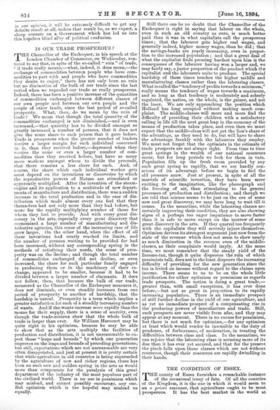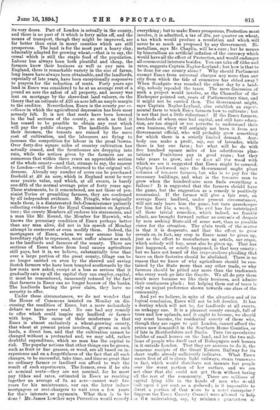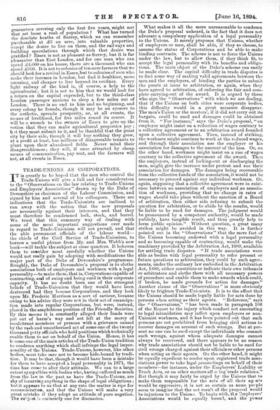THE CONDITION OF ESSEX. T HE county of Essex furnishes a
remarkable instance of the occasional irony of fate. Of all the counties of the Kingdom, it is the one in which it would seem to an a priori reasoner, that agriculture ought to be most prosperous. It has the best market in the world at its very doors. Part of London is actually in the county, and there is no part of it which is forty miles off, and the means of transport, though they might be improved, are far better than exist in many counties which are still prosperous. The land is for the most part a heavy clay, admirably adapted for growing wheat,—that is to say, the cereal which is still the staple food of the population. Labour has always been both plentiful and cheap, the farmers know their business as well as any men in England, there is remarkable variety in the size of farms, long leases have always been obtainable, and the landlords, especially of late years, have been exceptionally responsive to prayers for the reduction of rents. Forty years ago land in Essex was considerea to be at an average rent of a pound an acre the safest of all property, and money was lent on mortgage by the shrewdest land valuers, on the theory that an estimate of £25 an acre left an ample margin to the creditor. Nevertheless, Essex is the county par ex- cellence in which the agricultural depression has been most severely felt. It is not that rents have been lowered in the bad sections of the county, so much as that it has ceased to be possible to obtain any rent which will pay the public charges. The landlords have lost their incomes, the tenants are ruined by the mere cost of cultivation, and the labourers are flying to increase the competition for labour in the great !towns. Over forty-five square miles of country cultivation has actually ceased, and the farmhouses are dropping into ruin, while the notices given by the farmers are so numerous that within three years an appreciable section of the whole county—and that, strange to say, the nearest to London—will be derelict, returned to the original wil- derness. Already any number of acres can be purchased freehold at £6 an acre, which in England must be very near prairie value, and which, at all events, is barely one-fifth of the normal average price of forty years ago. These statements, be it remembered, are not those of pes- simist Tories or grumbling farmers, they are confirmed by all independent evidence. Mr. Pringle, who originally made them, is a disinterested Sub-Commissioner patiently collecting evidence for the Royal Commission on Agricul- ture; the county Members all endorse his statements, and a man like Mr. Round, the Member for Harwich, who knows the pecuniary condition of Essex perhaps better than any man alive, did not in his speech of Monday attempt to controvert or even modify them. Indeed, the mortgagees of Essex, whom we may assume him by hereditary right to represent, must suffer almost as much as the landlords and farmers of the county. There are sections of Essex where from local causes agriculture still pays, but it is, we believe, substantially true that over a large portion of the great county, tillage can be no longer carried on even by the shrewd and saving Scotch farmers who have been tempted southwards by the low rents now asked, except at a loss so serious that it gradually eats up all the capital they can employ, capital, it must be remembered, immensely reduced by the fact that farmers in Essex can no longer borrow of the banks. The landlords having the prior claim, they have no security to offer.
Under these circumstances, we do not wonder that the House of Commons insisted on Monday on dis- cussing the condition of Essex. but a more melancholy debate we have never read. No one Lad any remedy to offer which could inspire any landlord or farmer with hope. The cause of their misfortune is that Essex is almost exclusively a wheat-growing county, that wheat at present prices involves, if grown on such lands, a direct loss, and that the cultivation cannot be changed without a protracted and, we may add, rather doubtful expenditure, which no man has the capital to risk. The popular notions that other things can be grown, such as fruit or fine grasses, or wood, are all based on in- experience and on a forgetfulness of the fact that all such changes, to be successful, take time, and time so great that no ordinary farmer or landlord can afford to wait the result of such experiments. The former, even if he sits at nominal rents—they are not nominal, for he must pay tithes and rates, estimated in Essex as reaching together an average of 9s. an acre—cannot wait five years for his maintenance, nor can the latter induce mortgagees or rent-chargers to wait even a few years for their interests or payments. What then is to be done ? Mr. James Lowther says Protection would remedy everything ; but to make Essex prosperous, Protection must involve, it is admitted, a tax of 20s. per quarter on wheat, a tax which would produce a revolution and which will never be so much as proposed by any Government. Bi- metallism, says Mr. Chaplin, will be a cure ; but he means by bimetallism an artificial inflation of the currency which would have all the effect of Protection, and would endanger all commercial interests besides. You can take off tithe and rates, suggests Captain Naylor-Leyland ; but how is that to be done for one county alone ? Why should Parliament exempt Essex from universal charges any more than any city from which the tide of commerce has ebbed away ? When Sandgate was smashed the other day by a land- slip, nobody repealed the taxes. The mere discussion of such a project would involve, as the Chancellor of the Exchequer pointed out, years of Parliamentary time, and it might not be carried then. The Government might, says Captain Naylor-Leyland, also establish an experi- mental farm to teach Essex farmers how to cultivate ; but is not that just a little ridiculous ? If the Essex farmers, hundreds of whom once had capital, and still have educa- tion, are too stupid or too pervetse to understand their own business, they will certainly not learn it from any Government official, who will probably grow something for which there is a strictly limited demand. Any- body can make a profit, say, out of lavender, while there is but one farm ; but what will he do with five hundred square miles of his odoriferous plan- tations? Fruit-trees pay in good years ; but they take years to grow, and so dues all the wood with which we see it suggested that Essex might be covered. Captain Lockwood says the Government might plant colonies of ten-acre farmers, but who is to pay for the necessary buildings, and what is the ten-acre man to grow when the hundred-acre man finds everything a failure ? It is suggested that the farmers should have the game, but the suggestion as a remedy is positively nonsensical. If the farmer will give a fair rent, an average Essex landlord, under present circumstances, will not only leave him the game, but turn gamekeeper for him for 15s. a week. The evil has far outstripped all these trivial remedies, which indeed, we frankly admit, are brought forward rather as counsels of despair by men seeking State-aid of some sort, than as possible cures for the situation. The plain truth of the matter is that it is desperate, and that the effort to grow cereals or, in fact, any crop in Essex- must be given up, just as the effort to manufacture an article, say crape, which nobody will buy, must also be given up. That has just happened, or nearly happened, in that very county ; but we have not heard of the crape-makers pleading that taxes on their factories should be abolished. There is no reason that we know of why agriculture should be sus- tained by the State more than any other trade, or why farmers should be pitied any more than the tradesmen who every week go into the Gazette. We all do pity them much more because we like their business, and admire their continuous pluck ; but helping them out of taxes is only an unjust preference shown towards one class of the community.
And yet we believe, in spite of the situation and of its logical conclusion, Essex will not be left derelict. It has a destiny which will not be, for landlords at all events, an unhappy one. It is a pleasant county enough, full of trees and low uplands, and it ought to become, we should say must become, the residential county of those who, though they are eager to quit London, cannot afford the prices now demanded in the Southern Home Counties, or of late in Hertfordshire and Bucks. Turn the speculative builder of small houses on the land, and let the two mil- lions of people who dwell east of Bishopsgate seek houses in it outside London. That they are anxious to do it, the immense receipts of the Great Eastern Railway for its short traffic already sufficiently indicates. What Essex wants first of all is cheap light railways, steam tramways in fact, which would distribute not manure but people over the worst portion of her surface, and we are not clear that she could not get them without taxing all the rest of the community. There are millions of capital lying idle in the hands of men who wculd took upon 4 per cent. as a godsend ; is it impossible to divert a portion of that store to a novel enterprise ? Suppose the Essex County Council were allowed to help in ti e undertaking, say, by minimu n guarantees, o: guarantees covering only the first five years, might not that set loose a rush of population ? What has turned the desolate heaths of Surrey, which we can remember purchasable at £3 an acre, into valuable properties, except the desire to live on them, and the railways and building speculations through which that desire was gratified ? Essex is not as pleasant as Surrey, but it is far pleasanter than East London, and for one man who can spend £4,000 on his house, there are a thousand who can spend £500. It is not to colonies of ten-acre farmers that we should look for a revival in Essex,but to colonies of men who make their incomes in London, but find it healthier, more amusing, and cheaper to live beyond its confines. Every light railway of the kind is, of course, a help to the agriculturist ; but it is not to him that we would look for a return on the capital expended, but to the third-class London passenger anxious to sleep a few miles out of London. There is no end to him and no beginning, and every colony he founds, though it may be an eyesore to the msthetic, spreads prosperity, or, at all events, the means of livelihood, for five miles round its centre. It will be a wrench to the owners of Essex to give up the notion that they can make agricultural properties pay ; b it they must submit to it, and be thankful that the great city by their side, though it will buy nothing they grow, at a profit at least, has millions of disagreeable tenants to plant upon their abandoned fields. Never mind their disagreeableness ; they will, if once attracted by cheap means of communication, pay rent, and the farmers will not, at all events in Essex.




































 Previous page
Previous page